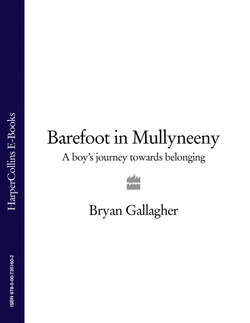Читать книгу Barefoot in Mullyneeny: A Boy’s Journey Towards Belonging - Bryan Gallagher - Страница 9
I Dreamt I Dwelt in Marble Halls
ОглавлениеIt was always an adventure going to fetch the weekly can of buttermilk, taking the shortcut by the fields, crossing the footstick over the river, avoiding the neighbour’s bull and eventually reaching the house. In truth it was little more than a hovel. The roof had fallen in at one end. Hens walked freely to and fro on the concrete floor. A calf nudged me gently in the back as I walked in the halfdoor.
The woman of the house always wore a man’s hat from which protruded wisps of dirty grey hair. Her face had that grimy coal-miner’s look from living in a smokefilled atmosphere, but her churn was always spotlessly clean and when she gave me the buttermilk, she did it with an air of refinement and accepted the fourpence graciously. I gradually picked up snippets of information about her. She had been reared with nothing but the best, a piano in the house, carpets on the floor, music and elocution lessons and she had been the belle of the countryside, quite beautiful, dressed always in the latest fashion. On Sunday people would stop to look at her going to Mass in her pony and trap. Then her parents died and her brother started drinking himself to death and the farm to bankruptcy. There were rumours of a broken love affair, and gradually things had deteriorated into their present state.
One St Stephen’s Day as I approached the house for the can of buttermilk I heard her singing. I stood near the dung-hill and listened. In a sweet quavering voice she was singing, ‘I Dreamt I Dwelt in Marble Halls’. It was as startling as a cough in a graveyard.
I went up to the half-door and looked in. In her hessian bag apron she was standing with her back to me in the middle of the floor and she was singing to the empty hearth. She had her arms stretched out in front of her as if she were singing to her lover on the stage. I moved back a few steps and coughed to let her know I was there. The singing stopped and I went up to the door and knocked. She took the can from me without a word. The black of her face was wet and smudged where she had wiped it with her bag apron. I never told anyone about it and she never mentioned it to me.
The years went by. The buttermilk was fetched by younger brothers and sisters and I went away to college, but I was told she always asked about me. I intended visiting her, but with the carelessness of youth, I never did, and the next time I saw her was when I attended her wake. She had died in her sleep. Someone had whitewashed the bare walls of the room where she was laid out. It smelt of damp and lack of use. An old harmonium stood in the corner. The sun shone through the overgrown whitethorn hedge outside the small window and a tracery of shadows moved caressingly to and fro over the ruined face that had once turned all heads on a Sunday morning.
Her funeral was a wretched affair. Nobody stood to watch her make her last journey to the chapel. A neighbour and myself helped to carry the coffin. He had also dug the grave. The service in the graveyard was hurried and everyone left quickly but I stayed to help him fill in the sticky clay. I felt it was the least I could do.
When we had finished, we arranged the sods in a neat rectangular border around the heaped earth and he took off his cap and crossed himself, and wiped the sweat from his brow.
‘Hard to imagine,’ he said, after a pause, ‘that there was one time when she could have had her pick of any man in the country.’
‘So why did she never get married?’ I asked.
And he told me about her one big love affair with a tall handsome policeman in the local barracks. He had been promoted to sergeant and transferred to another part of the country. He had written to her, asking her to marry him and she had replied, saying she would. She had given the letter to her brother to post, but he had torn it up and thrown it over the bridge into the river. Her words of love had floated away in a hundred pieces on the brown water and disappeared for ever into the dark depths of Lough Erne. And as I stood there, I could hear inside my head her sweet quavering voice and I knew now that it was the handsome face of a young policeman that she had seen in the dead ashes of the hearth when I had heard her singing all those years ago.
I had riches too great to count,Could boast of a high ancestral name:But I also dreamt which pleased me most,That you loved me still the same,That you loved me, you loved me still the same.
